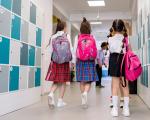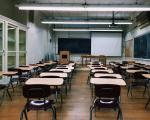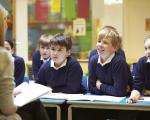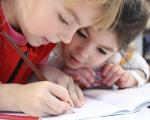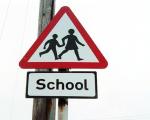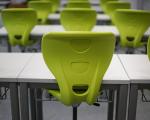Transport to faith schools
Discrimination on grounds of religion and belief is prominent in the provision of both discretionary and statutory home to school transport. We seek equitable school transport policies, free from religious privilege, fair to all families and fair to taxpayers.
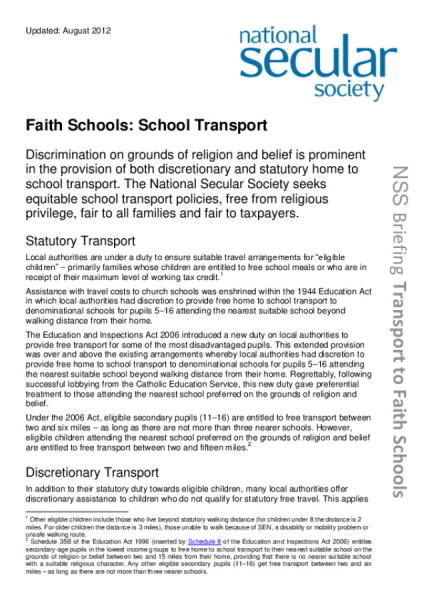 Faith Schools Transport Briefing Paper (PDF, 222 Kb)
Faith Schools Transport Briefing Paper (PDF, 222 Kb)
Related news
Schools block vaccine on religious grounds
Posted: Wed, 22 Dec 2021 08:38
A Hindu academy chain has blocked delivery of flu vaccinations in its schools, including those with no faith ethos, on religious grounds.
Explaining their decision in a letter to parents this November, the headteacher of Avanti Gardens School, said: "The use of pork gelatine in several of the vaccines used by the NHS is an issue for the MAT Board given the faith designation of many of AST's (Avanti Schools Trust) schools."
Porcine gelatine is an essential stabiliser in the Fluenz and Tetra nasal sprays used for children's flu vaccines.
The School Age Immunisation Services (SAIS) are responsible for delivering vaccinations, including for the flu and Covid-19, to children in this age range.
In 151 out of 152 local authorities in England, SAIS is delivered primarily through schools. Pupils in unregistered schools and schools that refuse to engage with the programme are particularly vulnerable to missing out. This disproportionately affects pupils from minority, particularly Jewish and Muslim, backgrounds.
The National Secular Society has urged the Department for Education to ensure that all pupils have equal access to in-school vaccination. In recent correspondence with DfE the NSS asked what steps are being taken to ensure delivery of vaccination and immunisation programmes in schools are not hampered by religious objections.
In response, schools minister Baroness Barran said "Where the department is alerted to schools continuing to refuse to participate with SAIS teams for an in-school offer, we will make enquiries as to the rationale behind this, and discuss ways to overcome any hesitancy."
The minister also advised parents concerned about faith schools objecting to the vaccine to talk to their local SAIS provider.
NSS comment
The National Secular Society's head of education, Alastair Lichten, said:
"It's concerning to see religious organisations undermining public health decisions in school. This impedes vaccination take up, contributes to vaccine misinformation and hesitancy, and disadvantages families attending schools under religious control, irrespective of their own beliefs.
"Cases like this also demonstrate how faith-based decisions are being imposed in non-faith schools through academisation."
Notes
- The NSS raised first concerns with the DfE in 2019 after receiving anecdotal evidence that some faith schools were refusing to engage with SIAS.
- According to the parent who originally shared their concerns, the policy was still in place at the end of term.
- The government do not hold data on individual schools' engagement with vaccination programs. There may be practical reasons why specific schools are not suitable locations for SIAS teams.
- At least one Avanti school in Hertfordshire is being used as a Covid walk in centre, although it is not clear whether the trust's decision not to support the SIAS extends to their Covid-19 programme for which pupils in four of their schools are currently eligible.
- Earlier this year the National Secular Society raised concerns with the Education and Skills Funding Agency that Avanti Schools Trust was failing to protect the ethos of non-faith schools.
Faith school that limits biology teaching fails inspection
Posted: Mon, 20 Dec 2021 15:19
An independent faith school that does not teach biology beyond Year 8 has been criticised by inspectors.
Beis Medrash Elyon, an "ultra-orthodox" (Charedi) Jewish secondary school for boys in the London borough of Barnet, was rated "inadequate" in its latest Ofsted inspection report, published last week.
According to the report, the school's secular curriculum is "too narrow". Beyond Year 8, there is "no formal learning in creative or technological education", and biology is "not taught at all".
This "limits pupils' learning opportunities", inspectors said.
The secondary school curriculum specifies pupils should learn about human reproduction and natural selection in biology.
In 2013, Charedi school leaders and advisors criticised plans to include evolution in the GCSE biology curriculum, and a Jewish school was found to be censoring GCSE science questions.
Additionally, the school's relationships and sex education (RSE) programme falls short of guidance because "it does not include teaching about LGBT relationships".
Schools are required to teach about protected characteristics in equality law, including sexual orientation, to secondary-age pupils in an age-appropriate manner.
According to the report, the school requested inspectors not to ask pupils about LGBT relationships.
In February a report from Jewish counter-extremism group Nahamu highlighted how a lack of sex education contributes to forced marriage in strictly-Orthodox Jewish communities.
It also said the exclusion of any reference to LGBT people in Orthodox Jewish schools means LGBT people in these communities face "very serious issues of consent" when presented with a universal expectation of early, heterosexual marriage.
The report said pupils complete some qualifications "as quickly as possible and at unusually young ages". This means pupils "do not develop deep knowledge and understanding in their subjects". Additionally, some teachers "do not have the training they need to become subject specialists".
It said pupils study GCSEs from as soon as Year 7. After Year 10, they leave to study at a yeshiva – a theological school which focuses on the study of traditional Jewish texts.
Inspectors also said there are "serious concerns" about the school's systems for recruiting staff, as the process does not pay regard to guidance on safeguarding.
Beis Medrash Elyon has never achieved higher than "requires improvement" in an Ofsted inspection since it opened in 2013.
NSS comment
NSS head of education Alastair Lichten said: "This damning report suggests this school prioritises preparing pupils for a life of religious study over preparing them for a life full of opportunities in wider British society.
"Its refusal to teach about LGBT relationships and its lack of biology lessons beyond Year 8 is very concerning, especially as a lack of adequate and inclusive sex education has been identified as a factor in the real issue of forced marriage in Charedi communities.
"The government must act to ensure faith schools that consistently fail are brought in line with basic school standards, even if those standards conflict with the school's religious ethos."
Closing non-faith Wigan school may be unlawful, NSS warns
Posted: Tue, 14 Dec 2021 10:14
The closure of a community school in Wigan may be unlawful, the National Secular Society has cautioned.
Wigan council plans to reduce excess school places by closing either Abram Bryn Gates primary community school or Holy Family Catholic primary school.
In a consultation response on proposed school reorganisation, the NSS said the loss of secular provision resulting from closing Abram Bryn Gates may result in Wigan Council being in breach of their obligation to provide pupils with a suitable education.
The Education Act 1996 places a duty on local authorities to provide schools sufficient in number and character to provide for all pupils the opportunity of "appropriate education."
The response also highlighted the significant risk of undermining human rights, particularly Article 9 of the Human Rights Act which protects the right to freedom of thought, belief and religion.
NSS research has shown that 81% of postcodes in Wigan experience high or extreme restrictions on the choice of a non-faith primary school. This affects 90% of postcodes in the Abram ward – a figure that would approach 100% if Abram Bryn Gate were to close, as five of its nearest six schools are faith-based. This would leave many families with no choice but a faith school.
Comments
NSS head of education, Alastair Lichten, said:
"Far too many families in Abram and across Wigan, already have no choice but a faith school. Increasing this problem by closing Abram Bryn Gates would raise serious questions about the council's legal obligation to ensure adequate school provision.
"All pupils should have reasonable access to a local schools organised around an inclusive community ethos, rather than a religious belief that they may not share."
Local opposition
The NSS has been supporting families campaigning against the closure of the community school. One local resident told the NSS:
"Closing this school would not only devastate pupils and staff but rip the heart out of the community too. Choice of non-faith schools is already limited for parents."
Another parent commented:
"My children love this community school, the alternative options are miles away and are faith schools. I want my children to make their own decisions with regard to religion, rather than have it forced down their throats at a young age."
Period products in schools may be restricted on religious grounds
Posted: Wed, 1 Dec 2021 14:41
The National Secular Society has warned that religious objections could be restricting the use of period products in schools.
New Department for Education (DfE) guidance for the period product scheme for schools urges schools to consider the "religious and cultural beliefs" concerning periods that "can restrict access to certain types of period products."
The guidance says schools should "be aware of religious and cultural beliefs around tampons when considering which products to buy" and "consider the views of parents and carers before distributing tampons to learners."
The NSS wrote to the DfE previously to raise concerns that earlier guidance suggested parental religious objections may take precedence over learners' own preferences and needs in influencing the provision of particular period products.
The DfE said it would "look for ways" suggested amendments from the NSS could feed into updated guidance. However, the minor changes within the new guidelines do nothing to address the concerns raised.
The DfE's equality impact assessment notes that "conservative attitudes among some groups that practice a variety of religions (e.g. Christianity, Hinduism, Islam, Judaism) can make it difficult for these learners to access period products, wider information on their use and menstruation", though this was not addressed in the guideline on reducing stigma.
In 2018 the NSS Unsafe Sex Education report revealed that some faith schools are promoting shame and stigmatism around menstruation and some period products. The report found that Islamic faith school Al-Hijrah (since closed) stated in the 'Personal hygiene' section of its policy, "…among the various types of pads, tampons may not be appropriate due to insertion."
Jewish faith schools Hasmonean High School and The King David High School refer to Leviticus in their teachings about relationships, which refers to a woman as "impure" during menstruation.
Comments
An NSS spokesperson said: "We welcome the Department's efforts to tackle stigma around menstruation through RSE and provision of period products in schools. But for the programme to fulfil its full potential, it should be pupil centred, and not hindered by religious beliefs.
"Pupils from conservative religious backgrounds are more likely to experience barriers to access period products and information. Such stigma shouldn't be reinforced, however unintentionally, by government guidance."
Quarter of independent faith schools fail Ofsted inspection
Posted: Wed, 1 Dec 2021 09:07
Ofsted's latest statistics show that in the last year 25% of non-association independent faith schools have not met required school standards.
Such independent faith schools are more than twice as likely as independent schools without a recorded religion to not meet full requirements, the figures reveal.
Non-association independent schools are not part of the Independent Schools Council and are inspected by Ofsted, as opposed to the Independent Schools Inspectorate.
Ofsted raised specific concerns about independent Jewish faith schools, 55% which did not meet the standards.
The report stated: "Muslim schools account for 45% of faith schools in this sector, followed by Christian schools (31%) and Jewish schools (24%).
"However, the number of pupils taught in Jewish schools tends to be larger than in the other faith schools. This means that the number of pupils attending Jewish schools (17,000) is over three times those attending Christian schools (4,700)".
The National Secular Society has played a leading role in reporting on the crisis of independent faith schools and pushing the government for improved standards and accountability. Common issues include narrow or censored curricula, poor safeguarding, refusal to teach about other religions or beliefs, and creationism taught as science. Poor or non-existent sex education is also another concerning issue.
In a section on ineffective safeguarding, the report added that faith schools "fare particularly poorly, with 11% judged to have ineffective safeguarding."
This is more than twice the number (5%) of all independent schools inspected, and more than triple the percentage (3%) of non-faith schools. Any schools with ineffective safeguarding are automatically judged as inadequate overall.
Comments
Head of Education at the NSS, Alastair Lichten, stated: "Many of these schools are failing because they prioritise religious indoctrination and faith formation over preparing pupils with the knowledge and experiences they need for adult life in modern Britain."
"Freedom for independent schools to take their own approach needs to be balanced with ensuring pupils' human rights, including to a basic education, are protected. It is concerning to see the response to this growing crisis has often been to criticise inspectors or the standards which exist to protect pupils' rights."
NSS warns against closure of non-faith school in Wigan
Posted: Wed, 24 Nov 2021 10:35
The closure of a non-faith school in Wigan would decimate secular provision in the area, the NSS has warned.
Wigan Council are consulting on plans to reduce surplus places in the Abram area of the borough. The consultation document sets out options to close of one of two schools – Abram Bryn Gates community primary school or Holy Family Catholic primary school.
The NSS has warned that the closure of the community school would exacerbate the existing problem of faith-based restrictions on school choice in the area.
NSS research has shown that 81% of postcodes in Wigan experience high or extreme restrictions on the choice of a non-faith primary school. This affects 90% of postcodes in the Abram ward – a figure that would approach 100% if Abram Bryn Gate were to close, as five of its nearest six schools are faith-based.
Despite a surplus of school places in some areas, the same research shows that in the past year 182 pupils across Wigan were assigned faith schools against family preferences. NSS research has also shown a systemic bias against community-ethos, or non-faith, schools in similar reorganisations.
The NSS has also warned that the current proposals to reduce surplus school places in Wigan will undermine families and children's freedom of religion or belief and potentially leave the local authority in breach of its duty to ensure adequate school provision.
As a voluntary aided faith school, Holy Family Catholic primary school has wide leeway to discriminate against pupils in admissions and teachers in employment. Keeping the school open would therefore increase levels of discrimination faced by non-Catholic families and teachers in the area.
Wigan Council are running a statutory pre-publication consultation until 13 December 2021. Once a proposal is published, there will be a further four-week consultation period between 10 February to 10 March 2022.
Comments
National Secular Society head of education Alastair Lichten, said: "Families in Abram, and across Wigan, already face some of the biggest restrictions on the choice of a non-faith primary anywhere in England. It would be outrageous and unjust to further increase these barriers. Every pupil should have reasonable access to a good local school with an inclusive community ethos, rather than an ethos based around a religion that they may not share."
Local parent Beth told the NSS: "As a family without faith, it's important to us that our children are able to make their own choices about religion without that choice being made for them, as with a faith school. Learning about faith is done perfectly within a non-faith school, my child recently learned about Diwali and wore a sari during an R.E lesson to celebrate and learn more about culture and diversity. As parents we should be able to choose whether or not our child is taught or told about religion, which is one of many reasons as to why Abram Bryn Gates needs to stay open."
Another local parent, Leanne, added that: "Losing this school will greatly harm our community and would force me to send my child to a faith school as Nicol Mere (the only other local non-faith school) is almost at capacity. If Abram Bryn Gates closes I will look into home schooling my child due to lack of community schools within the local area."
The NSS is responding to the consultation, and encouraging local supporters to join their campaign to Save Abram Bryn Gates, Wigan
Faith school fails fourth consecutive Ofsted inspection
Posted: Tue, 23 Nov 2021 08:57
An independent orthodox Jewish boys' school has been rated inadequate for the fourth consecutive time by Ofsted.
Talmud Torah Yetev Lev, an orthodox Hasidic Jewish school which operates from four premises in the north London borough of Hackney has consistently failed inspections since 2014.
Inspectors found that pupils were only "knowledgeable about their own community" and their knowledge and understanding of the major religions and cultures represented in modern Britain was "very limited". This indicated "poor social and cultural development", said inspectors.
"This, coupled with the limited development of English language and literacy skills, means that pupils are not well prepared for life in modern Britain", said the report.
According to inspectors, pupils do not achieve as well as they should due to too many teachers not having a good knowledge of the secular subjects they teach.
The school was also found to be in breach of its registration agreement by having 985 pupils on its roll, despite only being registered to admit 567.
Comments
NSS Chief executive, Stephen Evans, said the report's findings "came as no surprise".
"Too many independent religious schools have a reputation for poor standards of education. All children, including children of ultra-orthodox families, should be entitled to a rounded education.
"Children in consistently failing schools have been failed for too long. The intransigence of religious groups running such schools cannot be tolerated indefinitely."
NSS welcomes action on illegal faith schools
Posted: Fri, 19 Nov 2021 11:02
The National Secular Society has welcomed a new government service allowing the public to report unregistered schools they believe to be operating illegally.
This comes as Ofsted published updated data on their investigation and inspection of unregistered schools from 2016 to 2021.
Ofsted warned children in hundreds of such settings are in danger of being "robbed of their life chances" in unreliable and "squalid" environments and called on citizens to inform them of unprofessional educational practices.
Currently, only one in 10 referrals comes from the public, and just one in six from local authorities.
The inspectorate said many were operating openly, charging customers thousands of pounds, with some children are being taught in disused office blocks and semi-commercial units on "drab industrial estates".
Thirteen per cent of unregistered settings investigated were centres of religious teachings, and 22% had an explicit faith ethos, though such data is extremely patchy.
The NSS, which campaigns to protect children's rights in independent and unregistered schools, has continuously called for local authorities and communities to be better supported to tackle the prevalence of illegal schools. The tackling of unregistered faith schools has often been slow, despite some being registered as charities and known by local authorities.
Head of Education at the NSS, Alastair Lichten, said "We welcome the renewed action to tackle illegal faith schools. There is a difference between practically, and ideologically unregistered settings. The former may be unregistered through mismanagement or misunderstanding the law, and in most cases can change their services to comply. The latter group, overwhelmingly made up of religious schools, remain unregistered largely to avoid regulation or oversight.
"The number of young people falling out of the education system into unsafe, unregulated, and dogmatic 'schools' is a national scandal, fundamentally undermining children's human rights."
Ofsted are also concerned about 115 settings with home educated children. The NSS has previously warned of legitimate elective home education being used as a cover for illegal schooling.
Faith school to change all-white ethnicity form after NSS complaint
Posted: Tue, 16 Nov 2021 15:01
A faith school that put only white ethnic groups on an application form must change its admissions policy after the NSS raised concerns.
The Office of the Schools Adjudicator (OSA), which clarifies the legal position on school admissions policies, said it "shared the concern" expressed by the NSS that an "application form" on Lubavitch Girls Primary School's website implied certain ethnicities "cannot be prioritised, or cannot apply at all".
The school, which is a state-funded Orthodox Jewish school in north London, asked for pupils' "ethnic background" on the application form on its admissions page, but only listed "White – Orthodox Jewish", "White – British", "White – European" and "White – Other" as possible answers.
The NSS alerted the OSA to the form in May.
The OSA said that although the form was more likely to be a "post-admission form" rather than an application form, it "must be considered as part of the admission arrangements" because the school did not deny parents were expected to provide it at the point of application.
The OSA therefore upheld the NSS's objection that the form did not comply with the school admissions code regarding supplementary information.
It also expressed "serious concerns" about some of the details asked on the form in terms of data protection.
The OSA also upheld the NSS's objection to the school's oversubscription criteria, which state: "Priority in admissions will be given to children who are Jewish according to Halochah (Orthodox Jewish Law)."
The NSS said this was in breach of requirements that oversubscription criteria must be "clear" and "objective", because the criteria did not explicitly state what "Jewish according to Halochah" means.
The OSA upheld this objection as it "would not be possible" for an ordinary member of the public to understand which pupils were prioritised.
The NSS also expressed concerns that the oversubscription criteria could breach equality law under the grounds of race, because Orthodox Jewish law is sometimes interpreted to mean only those who are born to ethnically Jewish mothers are considered Jewish.
In 2009 the Supreme Court found the Jewish Free School (JFS) in London had broken the law by refusing to admit a boy whose mother was a convert to Judaism. The school had directly discriminated against the boy on the basis of race under the Race Relations Act 1976.
Although the OSA could not conclude that the school had ever interpreted Jewish law in this way, it said: "For the avoidance of doubt the school is bound by the precedent set in the JFS case and must ensure that its arrangements do not fall foul of the finding in the case".
The school must make the necessary changes to its admission arrangements by the end of February, the OSA said.
Lubavitch Girls Primary School describes itself as "strictly orthodox" and says it aims to provide a "Torah-true education". It became state-funded in 2004.
NSS comment
An NSS spokesperson said: "We welcome the findings of the OSA, and are glad that it takes the issues we raised seriously.
"No school should ever imply that only children from certain ethnicities need apply.
"Unfortunately, the link between faith-based admissions criteria and ethnic segregation is well-established. Religious discrimination in admissions must be abolished to ensure children suffer no barriers in attending their local school due to their ethnicity."
Racial discrimination and segregation at Jewish schools
- In April the OSA upheld a complaint against Menorah Primary School, also in north London, which asked rabbis to confirm that applicants were "halachically Jewish".
- Research consistently demonstrates that faith schools tend to be more ethnically segregated. In 2013 Humanists UK found that Asian pupils are under-represented in Jewish schools. And a 2017 report found more than 84% of non-Christian faith schools were considered to be segregated because of their disproportionate ethnic makeup.
Faith school continues to fail due to “narrow” secular curriculum
Posted: Wed, 10 Nov 2021 16:38
An independent faith school has failed three consecutive inspections due to its "narrow" secular curriculum.
Talmud Torah Toldos Yakov Yosef (TTTYY), an independent orthodox Jewish school for boys in London, was rated "inadequate" in its most recent inspection, according to a report published today by school inspectorate Ofsted.
It was also rated "inadequate" in its last two inspections in 2019 and 2017.
In its most recent inspection in June, Ofsted found the school's secular curriculum "narrow", and said leaders "give little time to secular subjects on the timetable".
The inspection report said that "pupils spend most of the school day doing Jewish studies" and the standard teaching of secular subjects is "weak". It said leaders and teachers "do not have the expertise to teach the secular subjects well" and "do not have high expectations for pupils' achievement". It added that pupils "struggle to read and write English".
The report said leaders "did not allow inspectors to ask pupils about relationships". It said there is "no evidence" pupils have an age-appropriate understanding of healthy relationships.
It added that the personal, social, health and economic (PSHE) curriculum is planned in a way that "respects the ethos of the school", and "does not pay due regard to all the protected characteristics" in the Equality Act 2010.
Schools are required to teach about protected characteristics in equality law, including sexual orientation, to secondary-age pupils in an age-appropriate manner.
The report said pupils "are not well prepared for life in modern Britain. It said they "know very little about different cultures" and "do not interact much with people from other backgrounds". Additionally, their knowledge of religions other than Judaism "does not go beyond knowing the names of religions".
Pupils in Years 7 and 8 "do not receive any careers guidance" and so they "have no idea about the choices on offer for them when they leave the school."
TTTYY's previous inspection reports made similar criticisms regarding the narrow secular curriculum, limited opportunities to learn about other cultures, and inadequate careers guidance.
NSS reaction
NSS head of education Alastair Lichten said: "It is very concerning that schools like this continue to operate after repeated inspection failures.
"Many of TTTYY's failings relate directly to its fundamentalist religious ethos. The school doesn't value preparing its pupils for life in 21st century society. Instead, it is preparing them for a life of limited opportunities within an insular and high-control religious community.
"The government must not allow this school to continue to operate if it refuses to address any of the failings identified by Ofsted. We must not permit children to be left behind their peers due to wishes of religious community leaders."
The NSS has long supported improvements to independent school standards, and warned that schools are not facing appropriate regulatory action despite repeating failing inspections.




